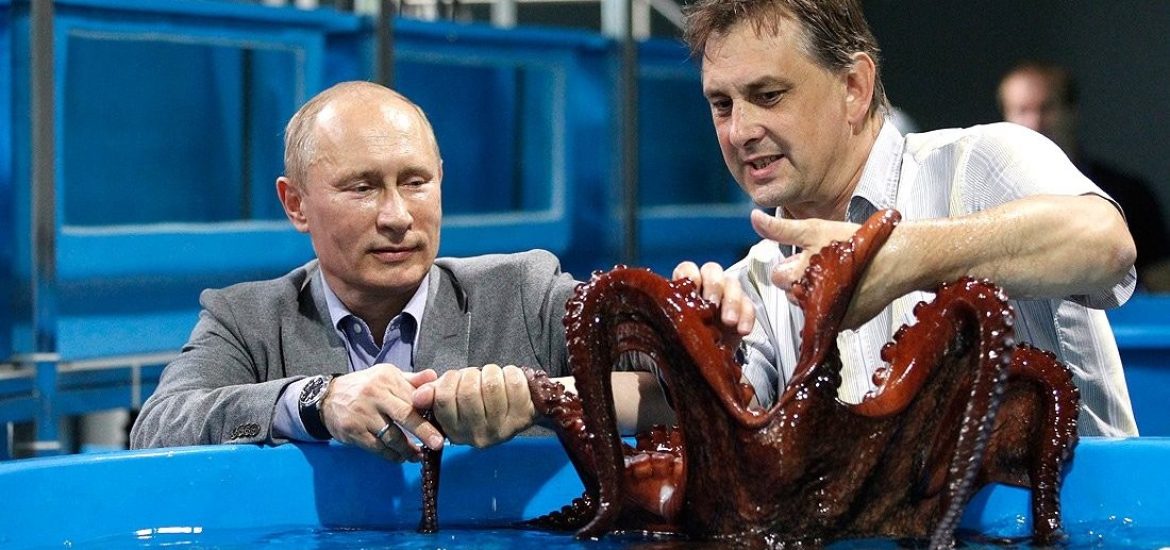
The topic today is an adversary that roams the recesses of Western polities, searching out avaricious and insincere populists to devour. To blind its enemies to its activities, and prevent direct attacks, it squirts black ink freely. It moves with steadfast purpose, quietly, even softly. You may think I’m describing a giant sea monster, but the octopus is miscast in this role. The adversary is more prosaic. It’s Russian oil money.
Two weeks ago, Russian oil money inked Italy. BuzzFeed uncovered a secret recording of three Russian oil company officials, a close aide of Italy’s far-right leader and Deputy Prime Minister Matteo Salvini, and two others, consecrating a deal to funnel oil money to Salvini’s Lega party. Salvini denies all wrongdoing and, on first read, the scandal seems unlikely to hurt him politically.
The octopus trope has reemerged in recent years to caricature Russia, which has used money and psychological warfare to weaken Western liberalism by favoring right-wing parties and leaders. There are an abundance of examples, including Brexit, Donald Trump, the National Front in France, and many others in Eastern Europe. Italy is only the latest, which makes the revelation unsurprising.
The story is important for two reasons. First, it reveals that Russia’s strategy is ongoing, despite everyone’s awareness of it. Second, it so nakedly exposes how central oil money is the strategy. Octopuses are not unstoppable monsters, just highly intelligent creatures – sporting nine brains! – that operate in dark places. Can Europe respond to this challenge with commensurate craftiness?
Russian Standard
This is not the first time that Russia has been likened to an octopus. In 1877, as it clashed with the Ottomans, Europe feared its industrial and war-making abilities.

Source: Wikimedia Commons.
The more apt historical analogy, however, is Rockefeller’s Standard Oil Company. By coming to influence or control all phases of oil’s value chain, including refining and transportation, not just production, Standard became a global monopoly. It was rightly deemed an octopus, or cephalopod, because it deployed its ink – shadowy money, unfair business practices, and oil-price discounts – to defend its market share.

Source: Wikimedia Commons.
Russia is deploying its oil money in similar ways to divide the West. By doing so, it seeks to strengthen bilateral ties with countries outside of the supranational EU bloc. Bilateral ties can yield more favorable political relations for the Kremlin, and are the safest way to keep oil and gas exports flowing. The EU has demonstrated its willingness to curtail Russian imports, first with the South Stream gas pipeline and now with the Nord Stream II gas pipeline.
Russia, then, is wielding its oil money to defend its market share in Europe in the same ways that Standard Oil did. The Salvini tape brings the story to light for us all to see, much as the famous American muckraker journalist Ida Tarbell did with Standard in the early twentieth century. The press must illuminate what is going on underneath the surface.
Discount shopping
After political connections, oil price discounts are Russia’s next best weapon to protect market share. The plan that surfaced in the recording has the Italian oil company ENI buying 3 million tons of oil for $1.5 billion from an unnamed Russian company. The company would in turn discount these purchases by roughly $65 million, which would be funneled to Salvini’s Lega.
Italy has a long history of buying discounted oil from Russia, and was Europe’s largest buyer of Russian crude in the first half of the Cold War. Frustrated buying from the Western majors, ENI’s founder Enrico Mattei imported increasing amounts of discounted Soviet oil after the 1956-7 Suez Crisis. (Mattei became a further thorn in the side of the Western majors by offering Iran discounted terms to explore for oil.) Following the 1960 Soviet-Italy oil agreement, NATO pressured Italy to reduce these purchases, leading to American trade sanctions from 1962-3. The result was enduring U.S.-Italian mistrust. Today, many Italians suspect that the CIA was responsible for Mattei’s death in a plane crash in 1962.
Fortunately, Italy no longer relies on Russia for its oil. The Kremlin only accounted for 3.1% of imports in the first quarter of 2018; Azerbaijan was 38.6% and Iran 29.2%. Yet Italy is the continent’s second-largest importer of Russian gas after Germany. Russia accounted for 40% of total Italian gas imports at the end of 2018. Italy also has the second-largest oil-refining capacity in Europe after Germany, making it a critical node for crude to enter the continent.
Italian battleground
The attempt to subsidize the Lega party may reflect some urgency from the Kremlin. This year, Italy signaled its preference for non-Russian gas-import options, perhaps because it relies entirely on Ukraine-transiting pipelines for Russian imports. It is unclear what will happen to these flows when the transit contracts end this December. Italy is backing both the Trans-Adriatic pipeline and East-Med pipeline as alternatives.
Italy has also made moves in oil that dent Russia’s European market share. In June, it imported a record 700,000 tons of U.S. crude in an effort to replace the Russian Urals crude used in Italian and German refineries. In early July, ENI also started production at Mexico’s first offshore oil field, and the company is moving forward in Algeria as well. By strengthening its energy portfolio, Italy becomes less susceptible to Russian oil money.
The Salvini tape reveals a bit of desperation on Russia’s part, but only because it came to light. It was not a coincidence that Russia announced it would ratify the Paris Climate Deal one day after the tape came to light.
Italy is a battlefield between the United States and Russia on politics and hydrocarbons. Climate change may be the gravest threat to human life, but far-right parties are the gravest threat to Western liberalism. We should be more cognizant of how easily Russian oil money can blind us to the dangers of both.
Picture credit: Kremlin






[…] Russian Oil Money Inks Italy Energy Reporters […]